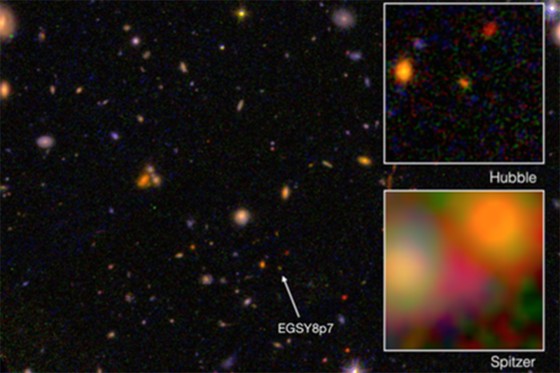The “Oldest Galaxy Ever” has been found, raises questions about the Universe
I love when people far, far, far more intelligent than me are confounded. Like these astrophysicists who have found the “oldest galaxy ever”, with an age “only” half a billion years younger than the Universe itself. And for reasons over my head, AstroLords say this galaxy shouldn’t exist. But it does! Ha! This isn’t schadenfreude, this glee of mine. Rather, my enjoyment of these folks befuddlement is derived from a desire to see the Universe continue to confound. Defy. Be mysterious.
Astrophysicists at Caltech say they’ve detected the oldest, most distant galaxy known so far. It’s 13.2 billion years old — just over half a billion years younger than the universe itself — and the discovery may change what astrophysicists know about the early history of the universe.
Adi Zitrin and Richard Ellis first spotted EGS8p7 with the Hubble Space Telescope and the Spitzer Space Telescope, and based on those initial observations, they decided it was worth a closer look. To learn more about EGS8p7, they needed different instruments, so they turned to the Multi-Object Spectrometer For InfraRed Exploration (MOSFIRE) on the Keck Observatory in Hawai’i.
Spectrographic analysis is a way of looking at the whole spectrum of electromagnetic radiation emitted by an object. In particular, they wanted to know the galaxy’s redshift. When an object in space moves away from us, the light waves get stretched out. Longer wavelengths of light appear redder, so the spectra of more distant objects will be shifted towards red. That’s called redshift, and astrophysicists often use it as a measure of the distance and age of galaxies.
EGS8p7 had a redshift of 8.68. Prior to its discovery, the oldest, most distant galaxy that scientists knew about had a redshift of 7.73. But its age and distance weren’t the only remarkable thing about EGS8p7.




